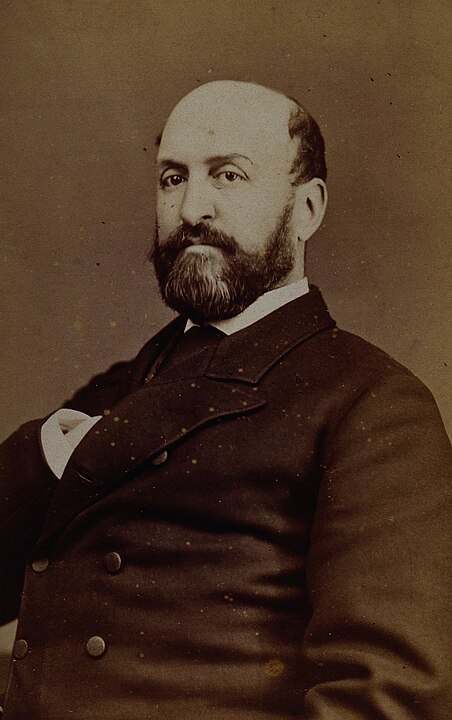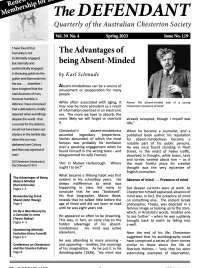An important study of Darwinian evolution has recently been released by Connor Court Publishing – Philosophical Notes: The Evolution of Evolution, by George Mivart.
Gary Furnell, a freelance writer who is Secretary-Treasurer of the Australian Chesterton Society, contributed the Introduction to the book. He has provided this adapted version for readers of The Defendant.

In 1895 George Mivart published, in the American Catholic Quarterly Review, a critique of atheistic evolution, and promoted a more reasonable alternative theory: theistic evolution.
Mivart—an Englishman—was active in the decades before Gilbert Chesterton’s maturity. Like Chesterton, Mivart challenged the prevailing scientific fashion with evidence and logic.
His critique began with a brief, cogent outline of the changing circumstances and variations in thought that over centuries facilitated the development of naturalism and atheistic evolution.
This background is beneficial because each generation— enmeshed in the peculiar conditions of their own time—often neglects to explore the past cultural twists, oversights, discoveries and aberrations that led to today’s
assumptions and outlook.
Mivart also highlighted the internal contradictions that fractured naturalism, and he indicated some of the problems in the evidence used to support atheistic
evolution. These fractures and variations of these evidential problems remain today.
St George Jackson Mivart (1827—1900) was an esteemed British naturalist, a Fellow of the Royal Society; vice-president (twice) of the Zoological Society and a Fellow of the Linnean Society. He was an early advocate of Darwinian evolution but parted company because its prominent proponents championed atheistic evolution. He thought theistic evolution made better sense of all
the evidence.
Rather like G.K. Chesterton, Mivart was an ardent— some would say an argumentative — Catholic.
He wrote that atheistic evolution was a type of semantic oversight: evolution from what? It posited a process but neglected to explain the origin of the material exploited by the process. Was matter eternal, or did it inexplicably pop into existence from nothing? Theistic evolution had a positive and sufficient answer to this question and so — with its starting point established — could properly describe itself as an evolution.
Mivart argued for the uniformity of natural causes in an open system and he opposed the contrary presupposition: uniformity of natural causes in a closed system. He believed that reality could not be explained solely by the energies, entities and processes already existent.
Rather, the energies, entities and processes had an origin beyond themselves—a divine origin. Put simply, Mivart affirmed the Ultimate was Personal, not impersonal.
The nature of this Person wasn’t addressed in his essay. Mivart argued for theistic evolution without promoting his own religion. He aimed to highlight the logical and evidential superiority of theistic evolution over atheist evolution.
Mivart lectured in anatomy and saw stable biological patterns—obvious everywhere in nature including human biology—that resisted attempts at explanation along atheist evolutionary lines. The Linnean classification scheme, for example, is only possible because of these persisting patterns.
Rational exploration – Irrational explanation
He enjoyed the irony that atheist evolutionists continued their rational exploration of the universe while announcing that everything that existed was irrational: a product of time plus chance. Theistic evolutionists don’t have this problem, believing a reasonable God made a reasonable (although largely puzzling) universe. Human reason, properly used, had its place—albeit limited by our common finitude.
Mivart argued that atheistic evolutionists had taken a helpful biological insight, limited in its effects—natural selection—and elevated its power beyond reasonable measure. Their theory developed into an all-encompassing ideology applicable to every sphere of biology, including all human activities.
Today, this imperialistic project continues. Spheres as diverse as economics, sociology, medicine, politics, sexuality, psychology, psychiatrics, linguistics, religion and ritual—every aspect of life in fact—are routinely subjected to evolutionary analysis. Theistic evolution escapes this presumption because it doesn’t need to explain everything through physical processes alone.
Instinct, for example, was an especially profound and precise facility whose origins were satisfactorily explained by theistic evolution, but it defies satisfactory explanation by atheistic evolution.
Instinct works to incredible effect in the humblest of organisms. This effectiveness is illustrated by injured crabs breaking off a damaged limb exactly where re-growth could begin. Mivart could have easily multiplied examples. I would add the existence of the human conscience—persistent and universal in its nature, enigmatic in its activity—is likewise better explained by theistic evolution.
Mivart thought atheistic evolution was doomed to speedy obsolescence because of its inconsistencies and the contrary evidences. He wrote, in 1895, that it was unlikely atheistic evolution would last a few years more. He was confident that theistic evolution would supplant it. His prediction was wrong.
Although he doesn’t use these terms, Mivart suggests that atheistic evolution is the favourite child of a favoured paradigm: the Enlightenment’s truncating scientism. Predicting atheistic evolution’s doom, he may have been better to say: When the paradigm changes—and this might be sudden—the favourite child might be abandoned.
It seems the paradigm is changing. In many universities the Enlightenment’s central tenets—glorious human reason; the unequivocal benefits of science and
technology; the easy correction of people’s faults and follies through improved social conditions, health care and education—are being portrayed as power plays that justify their own activities, with many of these activities consequently exposed (correctly or incorrectly) as exploitative, destructive of the biosphere, or aggrandising.
If the Enlightenment is dismantled, it’s likely Darwinism will not dominate as it does now. Theistic evolution may not dominate either. It’s possible any idea might emerge and capture the imagination of restive people.
Darwinism is already being dismantled, but not by theists. Biochemists, amazed by the abundant cellular evidence of intricate, deliberate design, are questioning evolution.
If he were alive today, Mivart might exult in the examples of fastidious design coming from molecular biology. Remarkable nano-structures, all sensitive to their minute cellular environment, abound. Prime-movers hauling bundles of chemical energy along self-constructing carriage ways; drive-shafts complete with cams and universal joints; protein factories, turbines, propelling engines and more—all of staggering complexity—are being brought to our astonished
apprehension.
Stunned wonder is one appropriate response. Reality is proving to be weirder than we imagined; it’s likely to be weirder than we can imagine.
Theistic evolution remains a theory, amenable to change—it should not become a doctrine. How life came into being and changed may well continue to be mysterious, beyond human understanding.
Two hundred and fifty years before Mivart, Pascal wrote:
Let man then contemplate the whole of nature in her full and lofty majesty, let him turn his gaze away from the lowly objects around him; let him behold the dazzling light set like an eternal lamp to light up the universe, let him see the earth as a mere speck compared to the vast orbit described by this star, and let him marvel at finding this vast orbit itself to be no more than the tiniest point compared to that described by the stars revolving in the firmament.
But if our eyes stop there, let our imagination proceed further; it will grow weary of conceiving things before nature tires of producing them. The whole visible world is only an imperceptible dot in nature’s ample bosom. No idea comes near it; it is no good inflating
our conceptions beyond imaginable space, we only
bring forth atoms compared to the reality of things.Nature is an infinite sphere whose centre is everywhere
and circumference is nowhere. In short it is the greatest
perceptible mark of God’s omnipotence that our
imagination should lose itself in that thought.”
